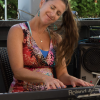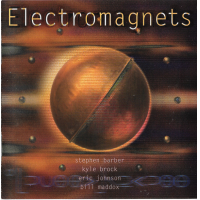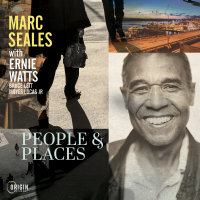Home » Jazz Articles » Interview » Dave Douglas: Moving the Music Forward
Dave Douglas: Moving the Music Forward
I don't feel the trumpet is the most important thing in the music I write.

Josh Roseman
trombone
Uri Caine
pianob.1956

James Genus
bassb.1966

Joey Baron
drumsb.1955
All About Jazz: You've been associated mostly with venues like the Knitting Factory. Now you're debuting at the Village Vanguard, which is not generally considered part of the "downtown" scene. Do you consider this an issue at all?
Dave Douglas: I feel that those boundaries are unfortunate and a disservice to the music. I do whatever I can to try and dismantle them.
AAJ: How are you finding your stint at the Vanguard so far?
DD: I love it. It's a family down there. It's low-key, everyone's real friendly, and the sound is incredible.
AAJ: Do you find that the second set is usually better than the first?
DD: It's always different. You never know. Sometimes the first set is great and then we're burned out. Sometimes the first set is just a prelude to the second. That's what I like about performing this music. There's a new surprise every night.
AAJ: You just released an album celebrating the legacy of

Mary Lou Williams
piano1910 - 1981
DD: I'm inspired by pioneers of the music, people who take chances, musicians who, rather than being flashy instrumentalists, are involved in composing and visualizing a new music. I see

Mary Lou Williams
piano1910 - 1981

Booker Little
trumpet1938 - 1961

Wayne Shorter
saxophone1933 - 2023
AAJ: Since you do spend a lot of time writing, away from the trumpet, do you find it a challenge to keep your playing on such a high level?
DD: Yeah, I do. It's a big challenge. It's always been that way. I go through cycles where I'm composing exclusively and I prefer not even to look at the trumpet, and then periods where I'm performing, like this week, and I don't write a note of music. Now I'm taking time to read

Mary Lou Williams
piano1910 - 1981
AAJ: The author, Linda Dahl, wrote the liner notes for Soul On Soul.
DD: Yes, and we didn't know about each other's projects until my record was done. I was talking to Peter O'Brien, Mary Lou's manager for the last fifteen years of her life, and he told me about the forthcoming book. So Linda and I talked for a few hours, and I got her to write these liner notes. You know, I've been listening to a lot of Mary Lou's stuff, transcribing and working on more pieces, and I feel like there's a whole other record here.
AAJ: It must be quite a task to narrow down all of her repertoire, although most of the stuff on Soul on Soul is by you, not Mary Lou Williams.
DD: That's what I think a tribute should be. I don't feel that tribute records should be ten interpretations of different pieces by that composer. I feel there's a lot more meaning behind what

Mary Lou Williams
piano1910 - 1981
AAJ: One usually sees individual tunes dedicated to a specific person, but not a whole program. This is a highly original concept.
DD: The reason I started it, with In Our Lifetime [Douglas's 1994 Booker Little tribute], is that for many years I avoided playing music with this instrumentation: sax, piano, bass, and drums. I didn't feel there was anything new for me to say. That's why I had started the Parallel Worlds band and the Tiny Bell Trio: more surprising instrumentation to try and stretch the sound of improvised music. In jazz, there's such an incredibly huge vocabulary that players have now. All the players in my band could turn around and play any style of music at any moment. And I could write virtually anything from? contemporary classical, klezmer to anything at all, these guys would kill. So as far as the sextet is concerned, the question is not what I put in, but what I leave out. When I realized this, it seemed like a great way to narrow down my focus and make a cohesive statement that moves forward.
AAJ: What about some of your work in the non-jazz realm??
DD: Well, that's the most interesting thing happening in music right now: we don't know what to call it anymore. Some people are really angry that we call this jazz, and others just call everything jazz. And I think that's great. The question itself is what's important.
AAJ: But you've done work with Sheryl Crow,

Suzanne Vega
vocalsDD: All music is immediately relevant. It's always been that way for me. I've always loved to play all different kinds of stuff. When I worked with

Horace Silver
piano1928 - 2014
AAJ: Speaking of music education, let's talk about yours. You did some jumping around from Berklee to New England Conservatory (NEC) to New York University (NYU). What precipitated those transitions?
DD: I started studying music when I was really young. I did classical harmony in high school, and I was trying to play jazz and improvised music by throwing all of that out the window, which I still do from time to time [laughs]. At Berklee, I was looking for a more in-depth experience with jazz harmony, and it was great for that. But I didn't feel I had a good trumpet teacher, and I always struggled with technique on the trumpet. It has not come easy for me and it's still not easy. So John McNeil was teaching the Carmine Caruso method at NEC, and I had been practicing at Berklee many, many hours daily, with very limited results. Within a month of using this Carmine Caruso technique, my chops just took off. And it all came together right in that year. NEC was also great for ear training, which is too often overlooked and very important for improvising musicians. But I just didn't want to be in Boston anymore; it was time to move to New York. While I was at NYU I was able to study with Carmine Caruso himself for two years. I still go about once a year to his student, Laurie Frank, who carries on his tradition of teaching.
AAJ: What are some of your upcoming projects?
DD: I've been writing dance music for the Trisha Brown company, which will premiere in New York at the Joyce Theater in May. I just finished recording a new Charms of the Night Sky album, which will come out in October on RCA. And I have a new band that premiered last October called Witness. All of the pieces are dedicated to social activist writers, thinkers, and philosophers from around the world. There are more details available at davedouglas.com. I got really angry during the war in Kosovo last spring, because I was traveling right near Yugoslavia when all that stuff went down, when we decided to start bombing them. I was reading articles in the paper every day about weapons makers and how their stock is going up and how great this war is for them, and then I would turn the page and see a million refugees. I've always read about social activism and change, and I've always been involved, but it's always been separate from the music. Witness brings them together.
Tags
Dave Douglas
Interview
David Adler
United States
Greg Tardy
Josh Roseman
Uri Caine
James Genus
Joey Baron
Mary Lou Williams
Booker Little
Wayne Shorter
Suzanne Vega
Horace Silver
Comments
PREVIOUS / NEXT
Support All About Jazz
 All About Jazz has been a pillar of jazz since 1995, championing it as an art form and, more importantly, supporting the musicians who make it. Our enduring commitment has made "AAJ" one of the most culturally important websites of its kind, read by hundreds of thousands of fans, musicians and industry figures every month.
All About Jazz has been a pillar of jazz since 1995, championing it as an art form and, more importantly, supporting the musicians who make it. Our enduring commitment has made "AAJ" one of the most culturally important websites of its kind, read by hundreds of thousands of fans, musicians and industry figures every month.








 Buy Now
Buy Now




















